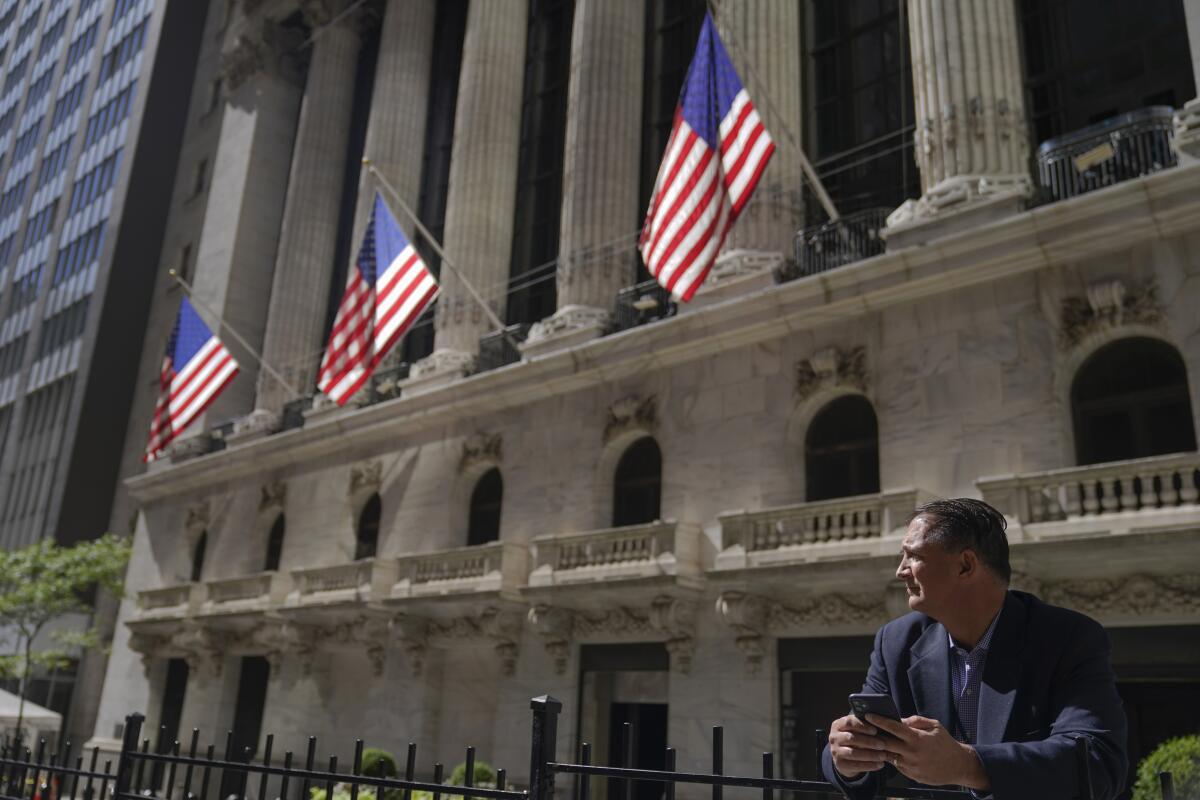Stocks close lower on Wall Street ahead of earnings reports

- Share via
Wall Street added to its recent string of losses Monday, as stocks fell ahead of a busy week of inflation updates and the start of corporate earnings reporting season.
The Standard & Poor’s 500 index fell 0.7%, extending its losing streak to a fourth straight session. The Dow Jones industrial average lost 0.3% after wavering between small gains and losses, and the Nasdaq composite fell 1%. The Dow and Nasdaq have also closed lower in the last four trading days.
Small-company stocks also fell, dragging the Russell 2000 lower by 0.6%. U.S. bond trading was closed.
Major indexes are coming off a volatile week during which they notched gains thanks to an early two-day rally that preceded several weak days.
Wall Street has been turbulent amid worries about stubbornly hot inflation and the Federal Reserve’s plan to tame high prices by raising interest rates. The goal is to slow economic growth and cool both borrowing and spending in order to get inflation under control, but the plan risks sending the economy into a recession.
Investors will potentially get a more detailed picture of the Fed’s thinking Wednesday when the central bank releases minutes from its latest policy meeting. That’s when the Fed made another extra-big interest rate increase of three-quarters of a percentage point.
“Nobody’s arguing about whether inflation is falling, it’s simply the slope of the slide,” said David Kelly, chief global strategist at JPMorgan Funds. “The inflation battle is being won and the problem is the recession battle may be getting lost unnecessarily.”
Wall Street will also get important updates on inflation and more insight into how that is affecting retail sales.
The government on Wednesday will release its report on producer prices, which will provide details for inflation at the wholesale level for businesses. The closely watched report on consumer prices will be released Thursday and a report on retail sales will be released Friday.
The latest sales update could confirm that consumers are increasingly stretched financially, or at least pulling back on spending. That could send a signal to the Fed, Kelly said.
“I’m just hoping the Fed is watching these indicators,” he said. “It should tell them they’re much closer to both beating inflation and killing the economy than they think they are.”
Uncertainty about how the economy will weather future Fed rate hikes has helped keep trading choppy on Wall Street. The major indexes were all briefly up Monday, before ending in the red by the end of the day.
The S&P 500 fell 27.27 points to 3,612.39. The Dow dropped 93.91 points to 29,202.88. The Nasdaq lost 110.30 points to close at 10,542.10. The Russell 2000 fell 10.23 points to 1,691.92.
Technology stocks were the biggest weights on the market. Makers of semiconductors and chip manufacturing equipment also suffered heavy selling after the U.S. government tightened export controls to limit China’s ability to get advanced computing chips, develop and maintain supercomputers, and make advanced semiconductors. Nvidia fell 3.4%.
Energy stocks fell as the price of U.S. crude oil dropped 1.6%. Occidental Petroleum slid 5.6%.
Healthcare stocks also helped pull the S&P 500 lower. Pfizer lost 1.4%.
Industrial companies and others considered less risky, such as household goods makers, held up better than the rest of the market.
A busy week of closely watched economic reports comes amid the opening to the latest round of corporate earnings reports. Those reports, and statements from companies and corporate executives, could help provide a clearer picture of how high prices are affecting sales and earnings and the expectations for the rest of the year and even into 2023.
PepsiCo, Delta Air Lines and Walgreens are among the big companies reporting earnings this week. Several major banks will report their results Friday, including JPMorgan Chase and Citigroup.
Inflation and recession risks remain top concerns, but COVID-19 and its potential to worsen slowing economic growth continue to linger. Stocks fell in Hong Kong and Shanghai on news of more lockdowns in China due to rising COVID-19 cases. Markets in Tokyo were closed for a holiday.
Casino and resort companies with operations in China slumped over worries about the effects of more lockdowns. Wynn Resorts fell 12.2% for the biggest decline among S&P 500 companies and Las Vegas Sands slid 7.6%
Associated Press writer Elaine Kurtenbach contributed to this report.
More to Read
Inside the business of entertainment
The Wide Shot brings you news, analysis and insights on everything from streaming wars to production — and what it all means for the future.
You may occasionally receive promotional content from the Los Angeles Times.










